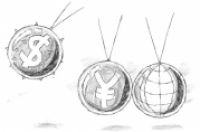
Illustration: Peter C. Espina/GT
Chinese President Xi Jinping is scheduled to meet US President Donald Trump at Mar-a-Lago, Trump’s resort in Florida on Thursday. The public has attached great attention to what the two leaders will talk about during their first summit, what kind of agreements they will reach and how the meeting will affect Sino-US relationship.
The two leaders are expected to discuss topics such as trade, North Korea’s nuclear program and the South China Sea issue. Among them, the debate over trade already has a strong smell of gunpowder.
US Commerce Secretary Wilbur Ross said the US has been in a trade war for decades. "We didn’t end up with a trade deficit accidentally... If trade deficits are good, why is China so pleased that they run a huge trade surplus? It’s perfectly obvious that if China hadn’t been such a huge net-exporter it never would have grown at the rate that it did," he said during a program on CNBC.
Additionally, Trump signed two executive orders on Friday to protect US trade, claiming they would "defend our industry and create a level playing field for the American worker - finally."
Chinese Vice Foreign Minister Zheng Zeguang told a briefing on Friday that China has not deliberately sought a trade surplus, noting that the Sino-US trade imbalance is mostly the result of the global distribution of industries, division of labor and differences in the two countries’ economic structures.
For China, in addition to bilateral trade, the meeting will be crucial in forming the country’s strategy for dealing with the US. In our view, Sino-US relations will be mainly characterized by balance with contentions in specific fields. Given the changes in the global landscape brought by adjustments in the US’geopolitical policies, the US is anticipated to carry out strategic retrenchment and focus more on internal affairs, providing a basis for China and the US to maintain a general balance in the geopolitical environment. Nevertheless, when it comes to specific and practical interests, such as trade, investment and employment, Trump, as a pragmatic president, will strive for more benefits and will be unlikely to make concessions.
Overall, such a bilateral relationship framework is beneficial to China, and the country should take measures to maintain stability in Sino-US relations. Seeking more common interests with the US should become an important strategy for China in the future. China needs to find the overlapping areas that the Trump administration cares about the most and continue to expand the common-interest areas.
Bilateral investment is another crucial area of common interest. In fact, bilateral investment between the two countries has surged in recent years, accumulating to more than $170 billion by the end of 2016, according to data from China’s Ministry of Commerce. While China continues to attract greenfield investment from the US, the country should also enhance investment in the US, either through greenfield investment or mergers and acquisitions, so as to create employment opportunities, which is exactly what Trump promised during his campaign and what he would like to see.
Furthermore, China needs to refine the environment and service for US investment in the country, especially in terms of further opening the country’s market. We have noted that the US has adopted a more complex national security review over foreign investment, which may be because of a "reciprocal relationship" consideration. Many Americans believe that if the Chinese market is not equally open to US companies, then some US markets should also shut out Chinese companies. Such thinking is a dangerous trend, requiring attention if both countries hope to strengthen bilateral investment in the future.




